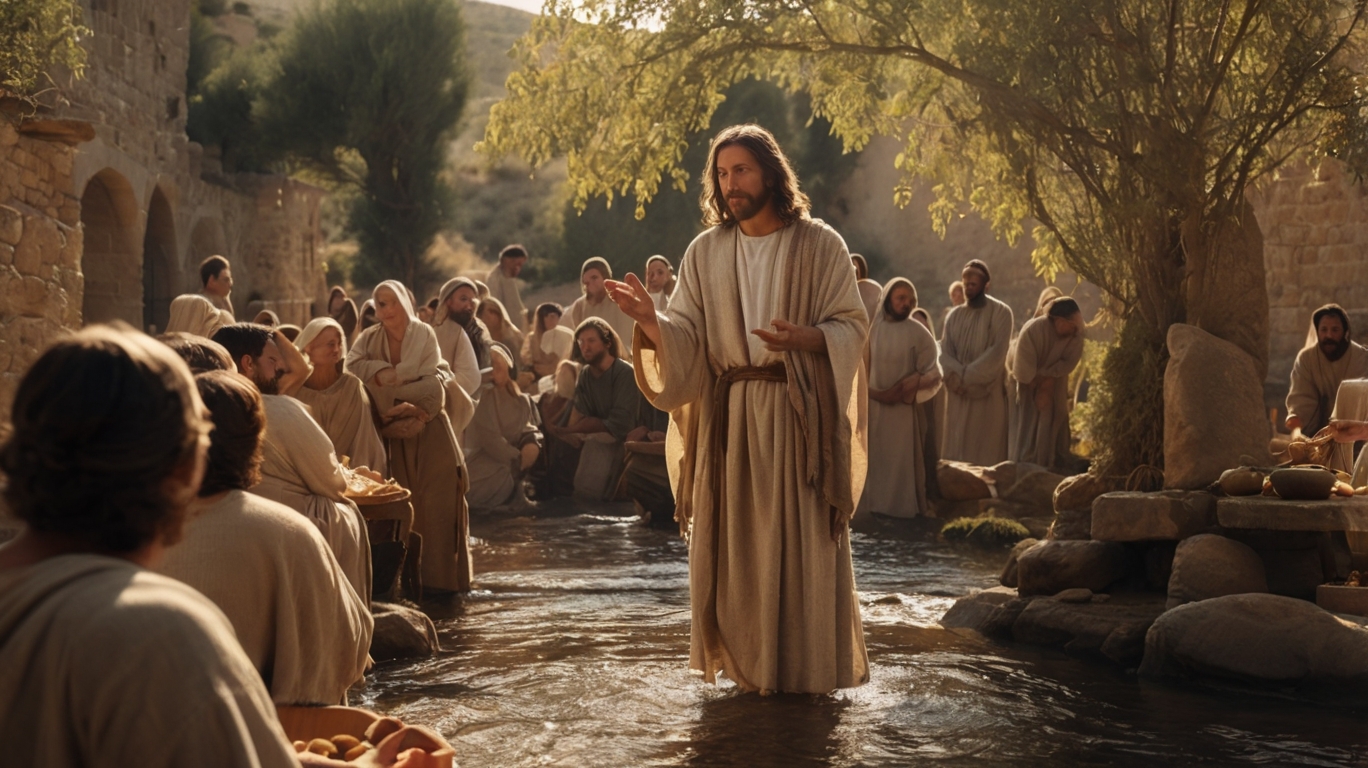Introduction To What Was Jesus Doing Before His Baptism?
The life of Jesus Christ before His public ministry is a subject of deep curiosity and theological reflection. While the Bible offers detailed accounts of His birth, early years, and baptism, it provides minimal information about His life from childhood to the moment He appeared at the Jordan River to be baptized by John the Baptist. This period, often referred to as the “silent years,” raises questions about what Jesus was doing before His baptism.
This article aims to delve into a few biblical accounts, cultural and historical contexts, and theological interpretations to explore what Jesus might have been doing before His baptism.
Early Life of Jesus: Birth and Infancy
Before discussing Jesus’ activities leading up to His baptism, it’s important to understand the significance of His early life. The Gospels of Matthew and Luke give us a glimpse of His birth and early childhood.
According to the Gospel of Luke, Jesus was born in Bethlehem to the Virgin Mary and her betrothed husband, Joseph. The miraculous nature of His birth is central to Christian theology, as Jesus is believed to be the Son of God incarnate. His birth was marked by the visitation of shepherds, who were informed by angels of His arrival (Luke 2:8-20), and the visit of the Magi, who followed a star to honor Him (Matthew 2:1-12).
After His birth, Jesus was taken to the temple in Jerusalem for purification according to Jewish customs. At the temple, Simeon and Anna, two devout individuals, recognized the infant Jesus as the Messiah (Luke 2:22-38). Afterward, Jesus’ family fled to Egypt to escape King Herod’s massacre of male infants (Matthew 2:13-18). They returned to Nazareth after Herod’s death, where Jesus spent His formative years.
The Silent Years: From Childhood to Adulthood
Between the ages of 12 and 30, the Bible is largely silent on Jesus’ life. The Gospel of Luke records one notable event during Jesus’ childhood: at the age of 12, Jesus traveled with His parents to Jerusalem for the Passover festival. After the festival, Jesus stayed behind in the temple, engaging with the religious teachers in deep theological discussions. His parents, unaware that He had stayed behind, eventually found Him after three days of searching. When questioned by His mother, Jesus responded,
“Didn’t you know I had to be in my Father’s house?” (Luke 2:49)
This event hints at Jesus’ growing awareness of His divine mission and relationship with God. However, after this, the Gospels provide little information about His activities until His baptism at age 30. Luke 2:52 offers a summary of this period by stating,
“And Jesus grew in wisdom and stature, and in favor with God and man”
Jesus’ Role as a Carpenter
One of the few things the Bible tells us about Jesus’ early adult life is His occupation. In Mark 6:3, Jesus is referred to as a “carpenter” when He returned to His hometown of Nazareth. The Greek word used here, tekton, can be translated as “carpenter,” “builder,” or “craftsman.” This indicates that Jesus likely worked in a trade, possibly building or repairing things made of wood, stone, or other materials.
In a humble and close-knit village like Nazareth, carpenters were essential to the local economy. They built homes, furniture, tools, and other necessities. This suggests that Jesus lived a relatively ordinary life as a tradesman, contributing to the daily needs of His family and community.
Jesus’ role as a carpenter has theological implications as well. Working with His hands and engaging in the daily tasks of life may have allowed Him to deeply identify with the human condition. It also aligns with the broader biblical theme of God working through ordinary means. Jesus’ time as a carpenter likely prepared Him for His future ministry, where He would build a spiritual “house” for humanity.
Family and Social Life

Jesus was born into a Jewish family in a devoutly religious culture. His family likely adhered to the customs, traditions, and rituals of Judaism, including observing the Sabbath, attending synagogue, and celebrating Jewish festivals. As the oldest son in His family, Jesus would have had certain responsibilities, particularly after the death of His earthly father, Joseph (although the Bible does not specify when Joseph passed away, he is notably absent from the Gospel accounts after Jesus’ childhood).
Jesus’ family included His mother, Mary, and His siblings—James, Joseph, Simon, and Judas, along with His unnamed sisters (Matthew 13:55-56). Although the New Testament doesn’t delve into the specifics of His relationship with His siblings, it is reasonable to assume that Jesus grew up in a typical Jewish household, participating in family activities and fulfilling His duties as the eldest son.
This family-oriented upbringing would have given Jesus insight into the everyday struggles and joys of life, further shaping His understanding of human experience.
Spiritual Development and Preparation
Although the Gospels are mostly silent about Jesus’ life during these years, it is reasonable to assume that He was growing spiritually, mentally, and emotionally in preparation for His public ministry. Luke 2:52 hints at this process:
“And Jesus grew in wisdom and stature, and in favor with God and man.”
This statement suggests that Jesus was actively maturing in His relationship with God and His understanding of the world around Him.
Jesus was fully human and fully divine, according to Christian theology. This dual nature meant that He had to grow and learn just like any other human being, even though He was without sin. His human experience allowed Him to sympathize with our weaknesses and understand the challenges we face.
The Role of Jewish Education
As a Jewish male, Jesus would have been immersed in the study of the Torah and Jewish law. Education in Jewish culture was highly valued, particularly the study of Scripture. Jewish boys began their formal education at a young age, learning to read and write using the Torah as their primary text. By the time they reached adolescence, they would have been well-versed in the teachings of the Law, the Prophets, and the Writings.
Jesus’ knowledge of the Scriptures is evident throughout His ministry. He frequently quoted the Old Testament, using it to teach, debate, and reveal His identity as the Messiah. This deep familiarity with the Scriptures suggests that Jesus dedicated time to studying and meditating on the Word of God during His early years.
Jesus and His Religious Community
Jesus grew up in a small village in Galilee, a region known for its strong Jewish traditions and religious life. The people of Nazareth would have been observant Jews, attending synagogue regularly and following the Jewish laws. Jesus likely participated in these religious activities, which would have further shaped His understanding of God, His mission, and His identity as the Messiah.
The synagogue was the center of Jewish religious life in small towns like Nazareth. It was a place of worship, learning, and community gathering. Jesus’ participation in synagogue worship would have given Him opportunities to learn from the religious leaders, engage in discussions about the Scriptures, and deepen His understanding of His divine calling.
The Influence of John the Baptist
Another key figure in Jesus’ life before His baptism was His relative, John the Baptist. John was a prophetic figure who preached repentance and baptized people in the Jordan River as a sign of their commitment to turning away from sin. The Gospel of Luke suggests that John and Jesus were related through their mothers, Elizabeth and Mary (Luke 1:36). Although the Gospels do not provide specific details about their interactions before Jesus’ baptism, it’s possible that Jesus was aware of John’s ministry and message.
John’s call to repentance and his emphasis on preparing the way for the Messiah may have influenced Jesus as He prepared for His own public ministry. John himself recognized Jesus’ unique identity, declaring, “Behold, the Lamb of God who takes away the sin of the world!” (John 1:29, ESV) when Jesus approached him for baptism.
The Transition to Public Ministry
By the time Jesus reached the age of 30, He was ready to begin His public ministry. In Jewish culture, 30 was considered the age of maturity, when a man could assume greater responsibilities and leadership roles. It was also the age at which priests began their service in the temple (Numbers 4:3).
Jesus’ decision to be baptized by John marked the beginning of His public ministry. His baptism was a significant moment, as it was accompanied by the descent of the Holy Spirit in the form of a dove and the voice of God declaring,
“This is my Son, whom I love; with him I am well pleased” (Matthew 3:17)
This divine affirmation confirmed Jesus’ identity as the Son of God and His role as the Savior of humanity.
Conclusion: What Was Jesus Doing Before His Baptism?
While the Bible provides limited details about Jesus’ life before His baptism, it is clear that He was living a faithful, obedient life in preparation for His mission. Jesus likely spent these years working as a carpenter, supporting His family, participating in the religious life of His community, and growing in wisdom, stature, and favor with God and man.
His “silent years” were not wasted but were essential for His preparation for the public ministry that would change the course of history. During this time, Jesus experienced the full range of human life, from the mundane tasks of daily work to the joys and challenges of family and community life.
These experiences, combined with His deep knowledge of the Scriptures and His unique relationship with God, equipped Him to fulfill His role as the Messiah.
The period before Jesus’ baptism reminds us that God often works through ordinary means and quiet preparation. Jesus’ life during these years was one of humble obedience, setting an example for all believers to follow in their journeys of faith.
